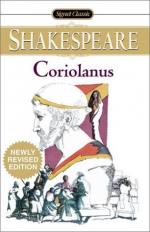|
This section contains 19,040 words (approx. 64 pages at 300 words per page) |

|
SOURCE: “Martial Ambition and the Family Romance in Coriolanus,” in Shakespeare and the Hazards of Ambition, Harvard University Press, 1984, pp. 142-221.
In the following excerpt, Watson views Coriolanus's development in the play as a journey from his “natural self,” as a man with a questionable hereditary identity, to an “artificial self,”—an ideal, even divine, warrior.
Coriolanus aspires to replace his limited hereditary identity with an ideal martial one, to transform himself from a merely human creature, made of flesh, appetite, and compassion, into a virtually divine warrior, made of steel, honor, and wrath. The story of Coriolanus' journey from a natural to an artificial self has epic attributes. It begins in medias res; it implicitly involves the hero's temporary death, his visitation by a spirit from the underworld who informs his quest, and his battle with the gods; and from one viewpoint it becomes, like the Virgilian...
|
This section contains 19,040 words (approx. 64 pages at 300 words per page) |

|


